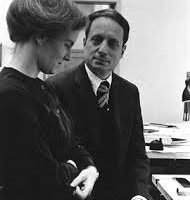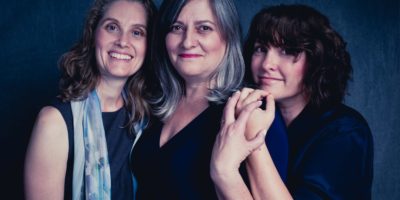Right to Left

“Song of Songs,” Lynne Avadenka, 1984. Photo credit: R.H. Hensleigh.
That first night, the most interesting part of my Hebrew language class is learning why people are taking a Hebrew language class. “You’re too old to be forced by your parents,” our teacher — jowly, balding — says. “So what on earth are you doing here?”
The seven of us stare back at him as if we speak no language at all. His round face under the flickering fluorescent lights glows like a fleshy moon.
“I mean, come on. Why are you spending your Thursday evenings in some dingy downtown community center? Why are you here when you’re surrounded by bars and boutiques and all those tall shiny buildings?”
Easy enough to translate what he really means to say: Why are we learning about the old when we are hemmed in by the new? Why are we interested in the basics of a tongue our parents did not care to have us learn?
“Tell me your name,” says the teacher, “is what I’m asking. And tell too why you are here.”
All the students in the class are like me: women in their twenties or maybe early thirties. So I expect mostly youthful idealistic responses to the “why are you here” question. Connecting to our roots, I expect. Understanding our past. Keeping that past alive.
But the reasons the others offer up are more practical. Several of the women have partners who want their children to grow up speaking Hebrew. One is studying foreign affairs. Another has just recently returned from Israel, where she admits to getting lost, unable to read any signs. Then the teacher points to me and says, “Well? You?”
“My grandmother’s ninetieth birthday is coming up, and she wants me to speak to her in Hebrew a little. As a gift.”
Everybody coos at my lie and I sense the false words lodge, undigested, in my stomach. I imagine the fib sitting there like a watermelon seed and I feel that little-kid fear: What if it grows big inside me?
Then we are all quiet again, and waiting, and our teacher says, “I always ask the intent on the first day. Why? Because Hebrew is an intentional language.” But he doesn’t explain what that actually means. He instead passes out an old and poorly Xeroxed handout full of letters and dots I can’t understand. We spend the rest of the class ululating vowels and grunting consonants together.
—
It’s true I have a grandmother turning ninety, but she could care less what language I use to talk to her. These days she speaks only the language of her personal past, a past nobody else can share. Her sisters and brothers and close friends are dead, and the older she gets, the more the living fade too. She no longer touches my hair or uses the Yiddish terms of endearment she once called me by (“shayneh maydeleh,” she’d trill). After I tell her I have finished my university courses, after I tell her I have been accepted into graduate school, she does not react at all. I go sometimes to visit her with my mother, but I become exhausted watching my mother’s attempts to hide the fact that she is nervous and trembling and wants to be home. I prefer going by myself.
One day my grandmother calls me Ruth. I have become a sign for her sister, who died young during the war. It is a version of Ruth who is made flesh when I walk through the doorway of the nursing home, a version of Ruth who sits by her bed, and I myself am the ghost.
When my grandmother’s ninetieth birthday approaches, I sign up to take Hebrew classes, not Yiddish. I am not interested in becoming Ruth. I am not interested in mastering my grandmother’s childhood language. No, the language I want to learn is the language of an older authority. I am interested in making appeals in the proper way, in the way I believe has the greatest chance of being heard. I want to ask for help in getting my grandmother to see me properly once more, and I want to ask in the right way.
I have tried asking in English but have grown embarrassed by the words I repeat again and again, like a child.
Bring her back. Bring her back as she was.
The refrain seems too sentimental, my only tongue too new for a plea so ancient.
—
The second class goes much like the first. The fluorescent lights flicker on the floor. We read from more handouts, fuzzy black ink on bright white typing paper. We learn new letters. Class participation has appeared purely voluntary, so I’m taken aback when the teacher calls on me to read a line. My shoulders jump a little and as soon as I begin to read, he stops me.
“No, no,” he says, shaking his round head and smiling a little. “You’re going the wrong way. Remember. Right to left.”
I’ve made a flustered absentminded mistake, but for a moment I want to argue with him anyway. Left to right. Doesn’t that seem more logical? Isn’t that, after all, the direction time flows? I’m stuck on the timelines created in elementary school history lessons, timelines that stretched across the board with a definitive force. I wonder, then, if my grandmother sees time the other way around. Perhaps she believes her granddaughter turning into her sister is the right order of things, the proper direction. Perhaps in the language she speaks now, time flows backwards.
The teacher clears his throat and I blink hard.
“Don’t worry,” he says. “Don’t look so worried. Just try again. But the right way this time. From the right side,” he adds, rolling his eyes.
—
When I stop by the nursing home to see my grandmother that week, she looks me right in the eye with such clarity that I believe she is back to her old self. She nods, once, twice. Then she falls asleep. I spend the next twenty minutes watching her. I know that when she looks at me, she may see dozens of family faces from her past, a multitude dead and vanished, and I search her slackened face for that same multitude. I should, at least, see signs of my mother and of myself. But the longer I look the stranger her face becomes. After a while her face does not remind me of other humans that I know, but of other things. A crumpled piece of paper. A bunched up washcloth. A mess of plaster on old wall. A wrinkled, caved-in peach. The longer I look, the more I believe we will never know how to speak to one another again.
I leave before she can wake up.




